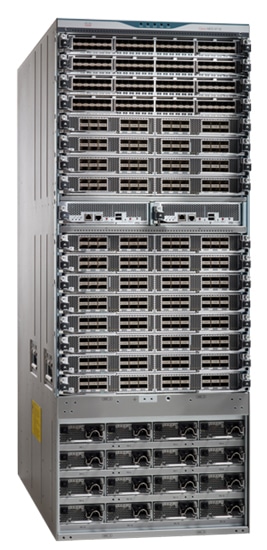Today Cisco announced a few new Fiber Channel (FC) solutions for its MDS line. These new announcements include the MDS 9718, which Cisco is calling the industry’s highest port density Storage Area Networking Multi-layer Storage Director. Cisco is also announcing the new 40 Gigabit FCoE Line Card for Cisco MDS Storage Directors, Cisco Nexus 5672UP-16G Data Center Switch and Nexus 2348UPQ Fabric Extender, and the Cisco UCS Fabric Interconnect 6300 Series and Fabric Extender 2304.
 The MDS 9718 (pictured MDS 9000) is the SAN industry’s first programmable director to support native RESTful API. Cisco is building the MDS 9718 to be future proof by having it support 10G, 16G, 40G speeds today and 32G in the near future, Cisco goes on to claim that the MDS 9718 is built to last up to 10 years. The MDS 9718 also offers twice as many line rate 16G ports as its competitors, 768 line rate 16G Fiber Channel ports (or 10G FCoE ports, or 384 40G FCoE ports). The MDS 9718 is ideal for customers that are looking to grow and consolidate their SAN environments.
The MDS 9718 (pictured MDS 9000) is the SAN industry’s first programmable director to support native RESTful API. Cisco is building the MDS 9718 to be future proof by having it support 10G, 16G, 40G speeds today and 32G in the near future, Cisco goes on to claim that the MDS 9718 is built to last up to 10 years. The MDS 9718 also offers twice as many line rate 16G ports as its competitors, 768 line rate 16G Fiber Channel ports (or 10G FCoE ports, or 384 40G FCoE ports). The MDS 9718 is ideal for customers that are looking to grow and consolidate their SAN environments.
In May of last year, Cisco introduced 40 Gigabit Converged Ethernet support across Nexus 7700 and Nexus 7000 platforms. This gave customers the flexibility to deploy 40 Gigabit FCoE, NAS, iSCSI, IP-based storage, and LAN connectivity on a single platform. Cisco is now expanding its 40G support to its MDS line, which they claim will give customers 294% higher ISL (Inter Switch Link) bandwidth compared to 16G and 47% higher ISL bandwidth compared to 32G. Cisco also states that upgrading to a 40G with a new line card will:
- Reduce data center cabling and the data center footprint
- Relieve ISL congestion and reduces ISL oversubscription
- Provide unified access with 40 Gigabit uplinks and 16 Gigabit connectivity to storage arrays
- Enable smooth cabling management because Cisco’s patented BiDi transceiver technology supports existing cable in the data center
- Offer greater ability for access control, zoning and port security implemented at the application level with the N port identifier virtualization (NPIV) feature
The Cisco Nexus 5672UP-16G Data Center Switch is the ideal choice for convergence, enabling 16G Fiber Channel, 40G FCoE and 40G Ethernet all from the same platform along with the complimentary Nexus 2348UPQ Fabric Extender, with support for multiprotocol storage and LAN connectivity. Supporting 24 ports of 8/16G FC, 6 ports of 40G FCoE, and 24 ports of 1/10 Ethernet, the Nexus 5672UP-16G can also provide up to 294% of the data rate of 16G, and optimizes data center unified access with high performance 40 Gigabit uplinks and 16G connectivity to Storage arrays. The Nexus 2348UPQ Fabric Extender can scale up to 96 16G FC ports, even on Cisco legacy Nexus 5600 platforms.
And finally Cisco is introducing the UCS Fabric Interconnect 6300 Series. The series features two 1U 40G switches and a new 40G Fabric Extender. The Fabric Interconnect 6300 Series employs the UCS Fabric, VIC and UCS Manager to enable a high-performance, low latency and lossless fabric architecture for high capacity data centers. This is the third generation of UCS Fabric Interconnect and the current version comes with some impressive performance improvements including:
- 2.6X increase in throughput
- 3X lower latency
- High-density 40GbE ports that enable an end-to-end 40 Gigabit solution




 Amazon
Amazon